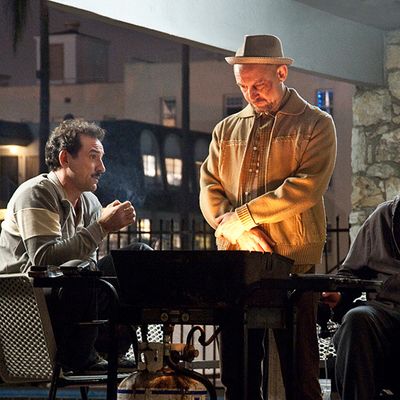
If you bailed on David Milch and Michael Mann’s HBO drama Luck after three weeks, I hope you’ll catch up with last night’s installment, “Both Hands on the Wheel,” and reconsider. If, on the other hand, you watched through last night’s episode and are still bailing, I say adios and don’t let the barn door hit your ass on the way out, because this is as good as TV gets.
Every line, scene, performance, shot, and cut worked in concert, then rose to a sublime new level in the sequence with exercise girl turned jockey Rosie Shanahan (Kerry Condon) riding Getting’up Morning to victory. That sequence was, for me, the emotional and cinematic equal of the death-of–Wild Bill sequence in episode four of Milch’s Deadwood, both in its masterful construction and its portrait of a community united in reaction to an extraordinary event. In a 2006 piece about Milch’s love of Robert Altman’s McCabe and Mrs. Miller, the writer-producer told me, “St. Paul is my guy, in terms of saying that idea of community is central to understanding, and that we mistake our deepest nature if we fail to realize that we are part of some larger organism.”
That realization came through in the Rosie sequence. As directed by Philip Noyce (Rabbit-Proof Fence, Salt), it conveyed the sense that there was no past or future, only an eternal present, and the differences between people had been briefly erased as if by the genial optimism of Muhammad Ali’s “shortest poem in the English language”: “Me, we.” I love how the sound cut out and was replaced by soaring music that seemed to herald an uncanny or transformative event — Rosie and Getting’up Morning merging into a winged centaur, then zooming into a sci-fi wormhole — and the way the shots of the race (extremely low and high angles and oddly composed inserts) were intercut with close-ups of onlookers, particularly the horse’s trainer, Walter Smith (Nick Nolte), whose ruddy face was streaked with tears. (Nolte is a world-class crier, right up there with Claire Danes. Who knew?) The sequence gave you a sense that the bettors, owners, jockeys, veterinarians, trainers, and other track regulars are as much a community as the people of Deadwood or the eccentric denizens of Milch’s short-lived From Cincinnati. In moments like this one, they all see, feel, and think the same things, and feel that they’re a part of something larger than any one person. Even Joey the agent (Richard Kind) — who was not happy that his own jockey got sidelined and replaced by an inexperienced young woman, and that he wasn’t going to get a piece of the huge payout from her surprising win — seemed to get swept up in, or maybe subsumed by, the electricity of the moment. This is why people attend sporting events, concerts, religious services, or any other kind of public gathering: to find themselves by losing themselves; to get beyond themselves.
Take away that extraordinary action scene and this still would have been a great, eventful episode. We finally met Mike (Michael Gambon), the former associate of Ace Bernstein (Dustin Hoffman) and the cause of his imprisonment, and he did not disappoint. He’s the only character besides Gus (Dennis Farina) whose charisma equals or exceeds Ace’s; there were a couple of moments when Ace seemed overmatched. Gambon is a great and terrifying actor, and he’s satanically frightening as Mike, offering women like pieces of candy, impassively sizing up Ace.
If Gambon’s character was the darkness in this episode, Joan Allen’s Claire was the light. Ace is so smitten with her that whenever she’s around, he stops being a scowling little sphincter of a man and becomes openhearted, goofy, and charming; he gave up $220,000 for her prisoners-for-ponies as if it were a tip for being so gosh-darned pretty. We also learned that Rosie and Leon (Tom Payne) are carrying on a secret Pat-and-Mike-type affair-of-the-accomplished, not unlike the relationship between the trainer Escalante (Jon Ortiz) and the veterinarian Jo (Jill Hennessy). Ronnie, the jockey who took a tumble last week and set the stage for Rosie’s Cinderella-like ascendance, seems to be caught in a doom-spiral of addiction and despair. Milch, who was once a drug addict himself, explores the mentality of substance abusers with more insight and panache than anybody writing for TV or movies; he gets how the feeling of hopelessness can itself become a kind of Über-drug released by whatever substances the addict imbibes. Ronnie at his worst seems to be experiencing a sort of anti-euphoria. (With his Ed Harris bald matinee idol face and watery eyes, Gary Stevens is a magnificently miserable screen presence.) I love the subplot about Jerry (Jason Gedrick) being a wizard at picking ponies, but a delusional and self-destructive poker addict. I’ve seen a lot of stories set in a world of gamblers, but I’ve never seen one that delves with taxonomic precision into all the different kinds of gamblers, much less one that shows how psychological issues can cause a person who’s unquestionably gifted, even dominant, in one area, to keep squandering his winnings in another. The relationship between Jerry and his regular poker nemesis Leo Chan (Dennis Dun) is also fresh; the character initially presents as a stereotype, but soon establishes himself as a unique and surprising character: a small businessman, community ringleader, and card-playing badass with a knack for figuring out exactly how to destroy his opponents (or push their buttons until they destroy themselves).
Best in show, though, goes to Nolte, whose soliloquy to Getting’up Morning’s murdered daddy Delphi was the episode’s other emotional peak. “I can barely stand to look at him day after day, because he reminds me so much of you,” Walter tells the future winner, who seems, thanks to Milch’s incantatory dialogue and Noyce’s restrained direction, to be understanding every word the old man says, and taking it to heart.


